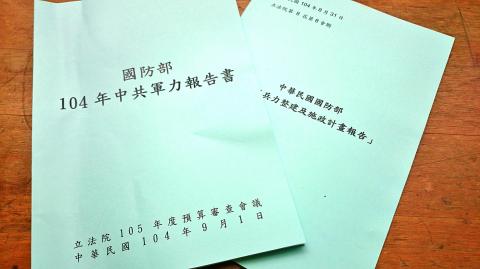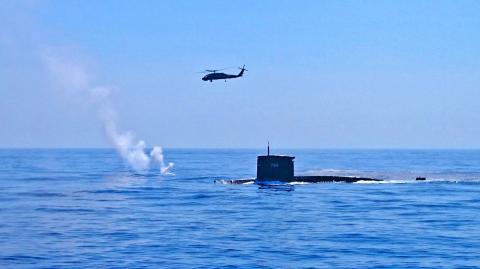China continues to target Taiwan for attack and invasion in the event of conflict, and Beijing is likely to declare a South China Sea air defense identification zone (ADIZ) in the near future to bolster its claim on the islets and reefs in the region, the Ministry of National Defense (MND) said.
According to MND reports released yesterday, Beijing convened high-level meetings to re-evaluate its cross-strait policies following last year’s Sunflower movement and related protests by Taiwanese against the government’s move to force a cross-strait service trade agreement with China through the legislature.
The report said China is concerned about the outcome of Taiwan’s presidential and legislative elections in January next year, and its People’s Liberation Army (PLA) has therefore conducted a series of military drills in recent months simulating an invasion of Taiwan, known as “Operation Decapitation,” in which airborne paratroopers and special forces practiced descending on the Presidential Office Building in Taipei City in a rapid assault.

Photo: Lo Tian-pin, Taipei Times
Outlining China’s plans for attack against Taiwan, the report said Beijing would first use a combination of military threats and actions to intimidate Taiwanese, then blockade major ports of the nation’s frontier islands, such as Kinmen, Matsu and other outlying maritime territories.
After that, PLA missiles and other firepower would be deployed to attack Taiwan’s major military and political headquarters, along with telecommunications infrastructure, which would be followed by mounting airborne and amphibious landings for an invasion.
The report said the possible scenarios for a Beijing attack could arise from situations such as Taiwan’s declaration of independence or heading unequivocally toward independence, acquisition of nuclear weapons, internal political turmoil, delaying of dialogue on cross-strait negotiations toward unification, foreign forces interfering in Taiwan’s internal affairs, or deployment of foreign troops in the country.

Photo: Lo Tian-pin, Taipei Times
The ministry said Taiwan’s armed forces are capable of defending the nation, and would undertake drills to simulate a defense of the Presidential Office Building and the greater Taipei area, in what is dubbed “Counter-Operation Decapitation,” during the yearly Han Kuang military exercises, which are scheduled to take place next week.
In the past few days, marine amphibious units together with other special forces troops have been seen conducting drills along coastal regions and shores of the Tamsui River (淡水河) in northern Taiwan, while the military police brigade tasked with maintaining the security of the Presidential Office Building have also been training to defend against a potential attack.
The report concluded that China’s island-building spree in the South China Sea has completely changed the strategic structure in the region, adding that China has stepped up militarization and to claim sovereignty while exploring deposits of oil, hydrocarbons and other natural resources.
China has begun reclamation work on seven reefs and is undertaking construction of a seaport, airport runways and other infrastructure facilities, the report said.
Additional reporting by CNA

ENDEAVOR MANTA: The ship is programmed to automatically return to its designated home port and would self-destruct if seized by another party The Endeavor Manta, Taiwan’s first military-specification uncrewed surface vehicle (USV) tailor-made to operate in the Taiwan Strait in a bid to bolster the nation’s asymmetric combat capabilities made its first appearance at Kaohsiung’s Singda Harbor yesterday. Taking inspiration from Ukraine’s navy, which is using USVs to force Russia’s Black Sea fleet to take shelter within its own ports, CSBC Taiwan (台灣國際造船) established a research and development unit on USVs last year, CSBC chairman Huang Cheng-hung (黃正弘) said. With the exception of the satellite guidance system and the outboard motors — which were purchased from foreign companies that were not affiliated with Chinese-funded

PERMIT REVOKED: The influencer at a news conference said the National Immigration Agency was infringing on human rights and persecuting Chinese spouses Chinese influencer “Yaya in Taiwan” (亞亞在台灣) yesterday evening voluntarily left Taiwan, despite saying yesterday morning that she had “no intention” of leaving after her residence permit was revoked over her comments on Taiwan being “unified” with China by military force. The Ministry of the Interior yesterday had said that it could forcibly deport the influencer at midnight, but was considering taking a more flexible approach and beginning procedures this morning. The influencer, whose given name is Liu Zhenya (劉振亞), departed on a 8:45pm flight from Taipei International Airport (Songshan airport) to Fuzhou, China. Liu held a news conference at the airport at 7pm,

GRIDLOCK: The National Fire Agency’s Special Search and Rescue team is on standby to travel to the countries to help out with the rescue effort A powerful earthquake rocked Myanmar and neighboring Thailand yesterday, killing at least three people in Bangkok and burying dozens when a high-rise building under construction collapsed. Footage shared on social media from Myanmar’s second-largest city showed widespread destruction, raising fears that many were trapped under the rubble or killed. The magnitude 7.7 earthquake, with an epicenter near Mandalay in Myanmar, struck at midday and was followed by a strong magnitude 6.4 aftershock. The extent of death, injury and destruction — especially in Myanmar, which is embroiled in a civil war and where information is tightly controlled at the best of times —

Taiwan was ranked the fourth-safest country in the world with a score of 82.9, trailing only Andorra, the United Arab Emirates and Qatar in Numbeo’s Safety Index by Country report. Taiwan’s score improved by 0.1 points compared with last year’s mid-year report, which had Taiwan fourth with a score of 82.8. However, both scores were lower than in last year’s first review, when Taiwan scored 83.3, and are a long way from when Taiwan was named the second-safest country in the world in 2021, scoring 84.8. Taiwan ranked higher than Singapore in ninth with a score of 77.4 and Japan in 10th with